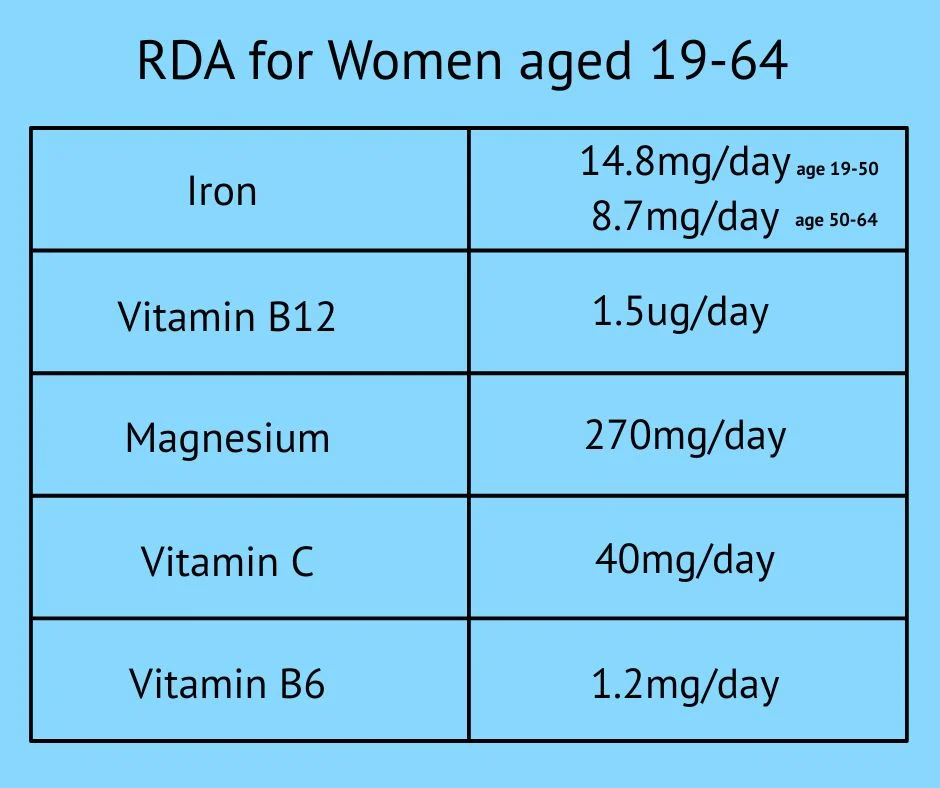Your basket is currently empty!
Which Vitamins Can Help With Fatigue?

While the first assumption is that sleeping patterns are the only part of your daily routine that affects how tired you feel, there are a lot of other processes in the body that can affect your alertness.
Nutrition is absolutely key to energy levels and feeling alert, and there are several vitamins that can affect fatigue and the daily energy levels in the body.
Women, in particular, can often be more prone to certain vitamin deficiencies due to menstruation, pregnancy, menopause and lifestyle habits, and you can find many vitamins and supplements that can help redress the balance to any dietary deficiencies.
Here are five vitamins and minerals for women to focus on:
Iron
Iron deficiency is the most common nutritional deficiency worldwide and a leading cause of anaemia in the UK.
While there are many nutritional sources of iron, it can be lost in several different ways which can contribute to fatigue, low mood and a lack of energy.
Vital for the production of red blood cells, Iron helps in the production of haemoglobin, transporting oxygen in the blood around the body.
Supplements with iron, particularly ferrous sulfate or ferrous gluconate, can help replenish iron stores and improve energy levels if sources such as red meat and spinach are not suitable.
Vitamin C is often recommended alongside iron to enhance absorption.
Vitamin B12
Also known as cobalamin, cyanocobalamin or methylcobalamin, vitamin B12 is a crucial part of ensuring that your energy levels are high, not just because they are essential for red blood cell formation but also because the vitamin is a critical part of metabolising other energy sources such as fats, carbohydrates and certain types of proteins.
Low vitamin B12 levels can lead to anaemia, fatigue, and cognitive issues.
Those following vegetarian or vegan diets are at increased risk of vitamin B12 deficiency since this vitamin is primarily found in animal products.
Vitamin B12 supplements may help balance levels, improve energy, and support nerve health.

Magnesium
In some respects, the importance of magnesium almost goes without saying, as it’s involved in over 300 biochemical reactions in the body.
Magnesium is crucial for energy production in cells and it’s an active mineral that helps in the function of nerves, the formation of cells and the uptake of oxygen in the muscles.
Women may become deficient due to inadequate dietary intake, stress, or excessive coffee or alcohol consumption.
Magnesium deficiency can lead to muscle cramps, poor sleep, and body fatigue.
Magnesium supplements can help relax muscles, improve sleep quality and boost energy levels, especially when taken before bed.
Vitamin C
Commonly found in fruit and vegetables, vitamin C is a vital antioxidant that is used to help absorb iron, which can combine with its own anti-fatigue effects to help promote alertness and boosted energy.
Vitamin C is crucial for collagen synthesis, immune function, and iron absorption.
A lack of fruits and vegetables in the diet can lead to vitamin C deficiency.
Vitamin C deficiency can result in scurvy, weakened immunity, and fatigue.
While severe vitamin C deficiency is rare, mild deficiencies can affect those with low fruit and vegetable intake .
Vitamin C supplements may help reduce tiredness and fatigue, enhance immune health, reduce oxidative stress, and boost iron absorption, leading to higher energy levels.
Vitamin B6
Vitamin B6, (pyridoxine), is involved in the regulation of hormone activity and neurotransmitter synthesis and can reduce tiredness and fatigue.
Women taking certain medications or with poor diets may be deficient.
Low vitamin B6 levels can cause anaemia, depression, and nerve damage, all contributing to fatigue.
Between 11-24 per cent of adults in the UK may have insufficient vitamin B6 levels due to dietary limitations or medication use.
Vitamin B6 supplements may enhance brain function, boost mood, and alleviate fatigue.
